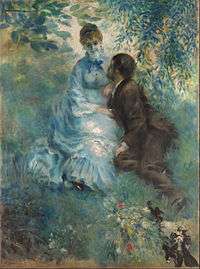Heimliche Aufforderung
| Heimliche Aufforderung | |
|---|---|
| Lied by Richard Strauss | |
 Lovers, by Pierre-Auguste Renoir, 1875 | |
| English | "The Secret Invitation" |
| Catalogue | Op. 27 number 3, TrV 170. |
| Text | Poem by John Henry Mackay |
| Language | German |
| Composed | May 22, 1894.[1] |
| Dedication | Pauline de Ahna, composer's wife. |
| Scoring | Voice and piano |
"Heimliche Aufforderung" ("The Secret Invitation" or "The Lover's Pledge"), Op. 27 No. 3, is one of a set of four songs composed by Richard Strauss in 1894. It was originally for voice and piano, but it was orchestrated in 1929 by the German conductor Robert Heger.[2] The text is from a poem in German by John Henry Mackay.
The first phrase of the song is "Auf, hebe die funkelnde Schale empor" (In English: "Up, raise the sparkling cup").
History
Strauss composed the song in 1894 and gave it as a wedding present to his wife, the soprano Pauline de Ahna.
Strauss recorded the orchestral version in 1941 with Julius Patzak (tenor) and the Bavarian State Orchestra,[3] and in 1944 the piano version with himself accompanying Alfred Poell (baritone).[4]
Lyrics
Strauss altered three words slightly: the originals are in square brackets.
Heimliche Aufforderung
Auf, hebe die funkelnde Schale empor zum Mund,
Und trinke beim Freudenmahle dein Herz gesund.
Und wenn du sie hebst, so winke mir heimlich zu,
Dann lächle ich und dann trinke ich still wie du...
Und still gleich mir betrachte um uns das Heer
Der trunknen Zecher [Schwätzer] – verachte sie nicht zu sehr.
Nein, hebe die blinkende Schale, gefüllt mit Wein,
Und laß beim lärmenden Mahle sie glücklich sein.
Doch hast du das Mahl genossen, den Durst gestillt,
Dann verlasse der lauten Genossen festfreudiges Bild,
Und wandle hinaus in den Garten zum Rosenstrauch,
Dort will ich dich dann erwarten nach altem Brauch,
Und will an die Brust dir sinken, eh du's gehofft [erhofft],
Und deine Küsse trinken, wie ehmals oft,
Und flechten in deine Haare der Rose Pracht.
O komm [komme], du wunderbare, ersehnte Nacht!
—John Henry Mackay (1864–1933)
The Lover's Pledge
Up, raise the sparkling cup to your lips,
And drink your heart's fill at the joyous feast.
And when you raise it, so wink secretly at me,
Then I'll smile and drink quietly, as you...
And quietly as I, look around at the crowd
Of drunken revelers – don't think too ill of them.
No, lift the twinkling cup, filled with wine,
And let them be happy at the noisy meal.
But when you've savored the meal, your thirst quenched,
Then quit the loud gathering's joyful fest,
And wander out into the garden, to the rosebush,
There shall I await you, as often of old.
And ere you know it shall I sink upon your breast,
And drink your kisses, as so often before,
And twine the rose's splendour into your hair.
Oh, come, you wondrous, longed-for night!
Translation: John Bernhoff (1912)[5]
Instrumentation and accompaniment
Orchestration by Heger:
2 flutes, 2 oboes, 2 clarinets, bass clarinet, 2 bassoons, 4 horns, 2 trumpets, 1 trombone, percussion, harp and string section[6]
Opus 27
The other songs of Opus 27 are:
- Op. 27 No. 1 "Ruhe, meine Seele!" (Nicht ein Lüftchen regt sich leise)
- Op. 27 No. 2 "Cäcilie" (Wenn du es wüßtest)
- Op. 27 No. 4 "Morgen!" (Und morgen wird die Sonne wieder scheinen)
References and notes
- ↑ Trenner, Franz (2003) Richard Strauss Chronik, Verlag Dr Richard Strauss Gmbh, Wien, ISBN 3-901974-01-6. Page 116.
- ↑ Robert Heger 1929 Score
- ↑ Richard Strauss, Vol. 8 on YouTube, Julius Patzak, Bavarian State Orchestra, Strauss conducting, 1941
- ↑ Recording on YouTube, Alfred Poell, Strauss (piano)
- ↑ "Heimliche Aufforderung" ["The Lovers' Pledge"], Für tiefe Stimme [For a low voice], Op. 27, No. 3, Richard Strauss, Wien Universal-Edition (5465c, 7758c), 1912
- ↑ Universal Edition full score
External links
- 4 Lieder, Op. 27: Scores at the International Music Score Library Project (IMSLP)
- Text and English translation for "Heimliche Aufforderung"
- Recording on YouTube, Ben Heppner, with orchestral accompaniment, James Levine conducting
- Recording on YouTube, Ben Heppner, with piano accompaniment